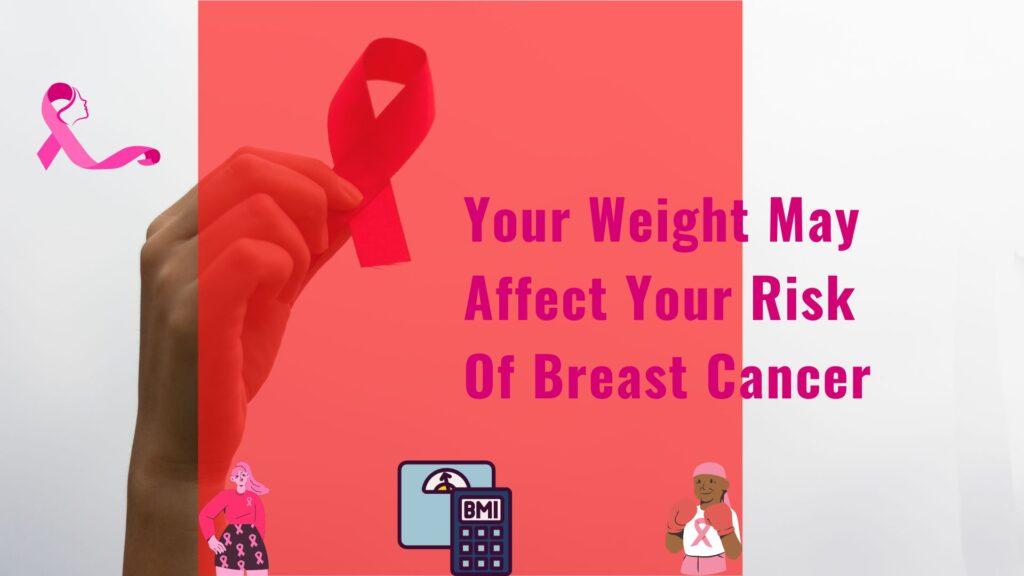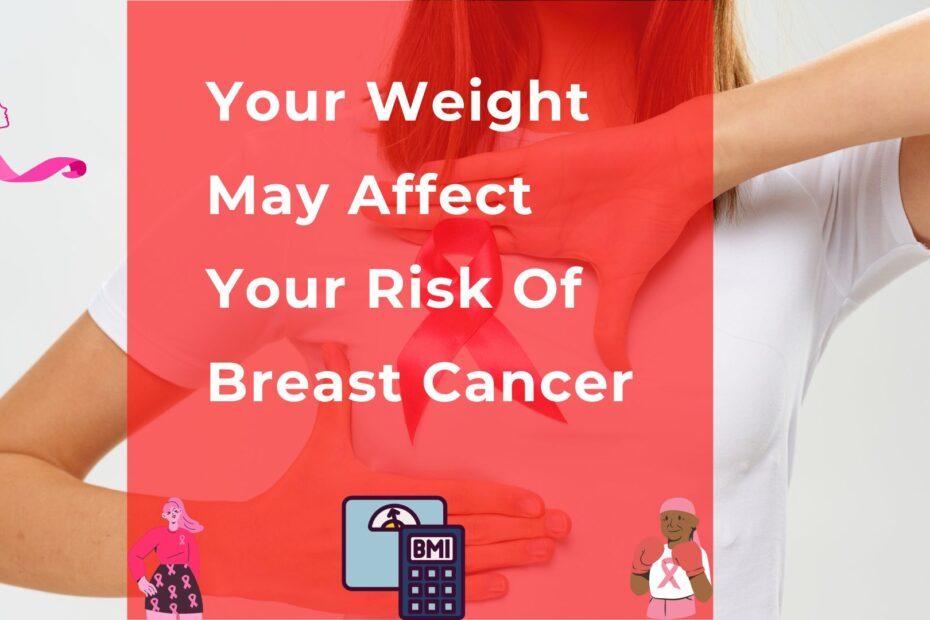Obesity and breast cancer: Obesity has become a significant health concern worldwide. In addition to being linked to other diseases, such as diabetes and heart disease, obesity also increases the risk of developing certain types of cancers. Breast cancer is the most common type of cancer affecting women globally. According to the World Health Organization (WHO), over 2 million new cases of breast cancer occur each year.
Genetic mutations or environmental factors cause breast cancer. The latter include lifestyle choices such as smoking, alcohol consumption, and obesity.
Facts About Overweight/obesity cause cancer?
Cancer has become a significant health concern around the globe. According to the World Health Organization (WHO), the Cancer burden has risen to 18.1 million new cases and 9.6 million cancer deaths in 2018. This number is expected to rise to 22 million by 2030.
The WHO estimates that 80% of cancers are preventable through lifestyle changes such as quitting smoking or avoiding alcohol consumption. Obesity is also associated with an increased risk of certain types of cancer.
Overweight and obesity are known risk factors for various types of cancer. The mechanisms through which excess body weight contributes to cancer development are complex and multifaceted.
Here are some ways in which overweight and obesity can increase the risk of cancer:
- Chronic inflammation: Excess body fat can lead to chronic low-grade inflammation, which can promote the development and growth of cancer cells and interfere with the body’s immune response to them.
- Hormonal imbalance: Adipose tissue (fat cells) produces certain hormones, such as estrogen, insulin, and insulin-like growth factors (IGFs). Elevated levels of these hormones in overweight and obese individuals can fuel the growth of certain hormone-sensitive cancers, such as breast, ovarian, and endometrial cancers.
- Insulin resistance: Obesity often leads to insulin resistance, a condition in which the body’s cells become less responsive to insulin’s effects. This can result in higher insulin levels in the blood, which may promote the growth of cancer cells.
- Altered metabolism: Excess body weight can disrupt normal metabolic processes, including regulating glucose and lipid metabolism. These metabolic changes can create an environment supporting cancer cell growth and proliferation.
- Immune dysfunction: Obesity can impair the immune system’s ability to detect and eliminate cancer cells. It can also negatively impact the effectiveness of cancer treatments, such as chemotherapy and immunotherapy.
- Fat cell characteristics: Adipose tissue in overweight and obese individuals undergoes structural and functional changes. These changes can contribute to the development and progression of cancer.
What types of cancer are linked to obesity?
According to the American Cancer Society, cancers of the breast, colon, endometrium (uterus), esophagus, kidney, liver, pancreas, prostate, stomach, thyroid gland, uterus, ovary, cervix, mouth, lip, tongue, tonsil, nasal cavity, brain, bone, blood, skin, eye, connective tissue, and non-Hodgkin lymphoma may be associated with being overweight or obese.
Obesity increases the risk for several cancers, including breast, colon, endometrial (uterine), kidney, liver, pancreatic, prostate, thyroid, and gallbladder. It also raises the risk for some non-cancerous conditions, such as diabetes and high blood pressure.
Factors Associated with Obesity and Breast Cancer
Factors Obesity is a known risk factor for developing breast cancer, but the relationship between the two is complex and multifactorial. Several factors contribute to the association between obesity and breast cancer, shedding light on why obese women may face an increased risk of this disease.
Tumor Size: It has been observed that obese women tend to have larger tumors at the time of breast cancer diagnosis. The exact mechanisms behind this correlation are not fully understood, but it suggests that obesity may play a role in tumor growth and progression.
Hormonal Factors: Adipose tissue, or fat tissue, produces hormones such as estrogen and insulin-like growth factor (IGF), which can promote the development of breast cancer. Obesity is characterized by increased production of these hormones, creating an environment that may facilitate tumor development.
Insulin Resistance: Insulin resistance, a condition in which cells become less responsive to insulin’s effects, is commonly associated with obesity. Insulin plays a crucial role in regulating blood sugar levels, but it also has other effects on the body, including promoting cell growth and division.
Age at Diagnosis: Interestingly, obesity has been linked to a younger age at breast cancer diagnosis. While the exact reasons for this association are not fully understood, it suggests that obesity may have different effects on breast cancer risk depending on the age of the individual.
Recurrence Risk: Obesity also impacts the risk of breast cancer recurrence, particularly in postmenopausal women. Studies have shown that obese women have a higher risk of recurrence compared to non-obese women. However, the relationship between weight status and recurrence risk may vary before and after menopause.
It is important to note that while obesity increases the risk of developing breast cancer and may affect treatment outcomes, individual factors and genetic predisposition also play a significant role in determining an individual’s risk.
Maintaining a healthy weight, engaging in regular physical activity, and adopting a balanced diet can reduce the risk of breast cancer and improve overall health.
Breast Cancer Early Signs
Early detection is crucial in the successful treatment of breast cancer. Recognizing the early signs and symptoms allows prompt medical evaluation and appropriate intervention.
Here are some common early signs of breast cancer to be aware of:
- Breast lump or thickening: A lump or thickening in the breast or underarm area is often the first noticeable symptom of breast cancer. It may feel different from the surrounding tissue and persist even after the menstrual cycle.
- Changes in breast size or shape: Any unexplained changes in breast size, shape, or contour should be evaluated. This may include swelling, shrinkage, or asymmetry between the breasts.
- Nipple changes: Look out for changes in the nipple, such as inversion (pulling inward), retraction, or a change in direction. Discharge from the nipple, mainly if it is bloody, should also be evaluated.
- Skin changes: Pay attention to any unusual changes in the skin of the breast, such as redness, dimpling, puckering, or thickening. These changes may resemble an orange peel texture.
- Breast pain or tenderness: While breast pain is not always a sign of breast cancer, persistent or unexplained pain in the breast or nipple should be evaluated by a healthcare professional.

Breast cancer awareness
The association between breast cancers and increased body mass index (BMI) and abdominal obesity may be related to increased estrogen levels, according to new research.
It’s important to note that while overweight and obesity are risk factors for cancer, not everyone who is overweight or obese will develop cancer. The risk varies depending on individual factors such as genetics, lifestyle choices, and overall health.
Obesity and breast cancer: To reduce the risk of cancer, it is recommended to maintain a healthy weight through a balanced diet, regular physical activity, and lifestyle modifications. Regular screenings and early detection are also crucial for detecting cancer in its early stages when it is most treatable.
Steps you can take
- Early detection: Breast cancer has a higher chance of successful treatment when detected early. Breast self-exams, clinical breast exams, and mammograms are essential tools for early detection.
- Losing weight can be more complicated as you age, but it can be done with careful diet changes and regular exercise. The first thing to do is talk to your doctor about a healthy weight based on age, height, body type, and activity level.
Source & Credits
Breastcancer.org provides this information.
https://tribuneonlineng.com/increases-in-bmi-potty-belly-linked-to-higher-risk-for-male-breast-cancer
https://www.cancer.org/cancer/breast-cancer/screening-tests-and-early-detection/breast-cancer-signs-and-symptoms.html
Overtraining Symptoms: Gaining Weight While Working Out

Obesity has been linked to an increased risk of breast cancer. Let’s prioritize our health by adopting a healthy diet, engaging in regular physical activity, and maintaining a healthy weight
Es crucial entender que la obesidad no es solo una cuestión de estética o de peso, sino que puede tener serias implicaciones para la salud, incluyendo un mayor riesgo de varias enfermedades crónicas, como el cáncer.
Obesity is associated with a higher risk of chronic diseases. Breast cancer is one of the malignancies, which has been related to obesity.
Great Article!!!
Breast cancer is a topic close to my heart, and I’m glad to see it being discussed openly. This link provides a wealth of information on self-examinations, regular screenings, and the importance of early detection. Let’s spread awareness and empower more individuals to take charge of their breast health
Obesity not only impacts cardiovascular health but also increases the risk of breast cancer in women. Studies have shown a strong association between obesity and an elevated risk of developing breast cancer, particularly in postmenopausal women.
It’s important to raise awareness about the link between breast cancer and obesity. Thank you for sharing this information.
Obesity is a serious issue that affects millions of people worldwide. It’s important to approach this topic with empathy and understanding. Let’s work together to promote healthy lifestyles and support those struggling with weight management.